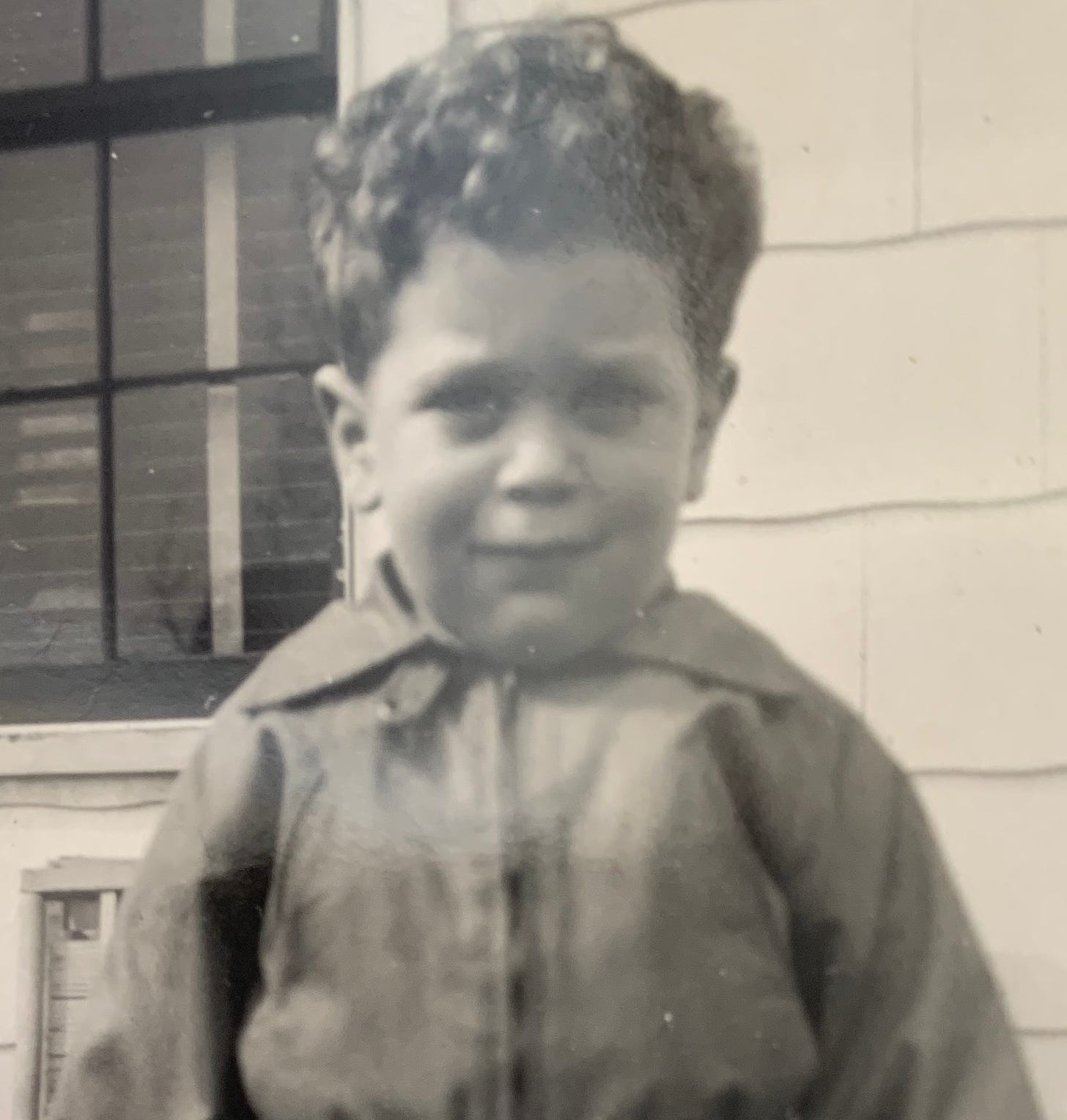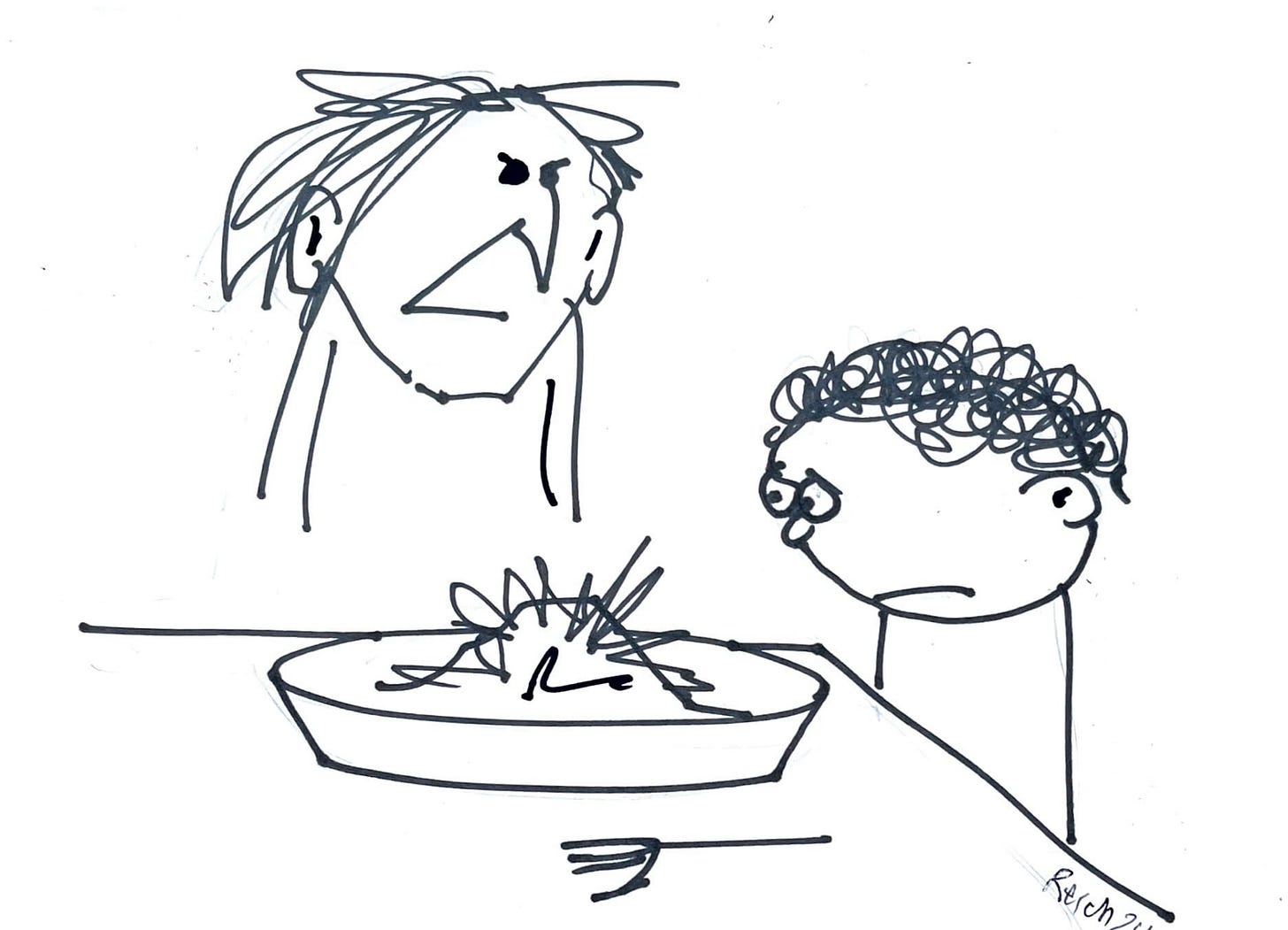Why I was expelled from Miss Bouton’s nursery school
The start of my schooling did not go well
Friends,
From time to time, I share with you some personal stuff on the assumption that after more than two years of receiving my daily letters, you have every right to know a bit more about me.
Some of you have asked about my education.
It did not get off to an auspicious start. I was expelled from Miss Bouton’s nursery school for excessive sarcasm. I was four years old.
I remember Miss Bouton as a scarecrow of a woman — tall and angular, with a thin nose, sharp chin, and arms and shoulders like the sawed-off limbs of a tree. She seemed very old, and she spoke in a high, raspy voice. She rarely smiled. Her orders — and that’s all I recall her emitting — sounded like the barks of an angry animal.
Miss Bouton ran the only nursery school in South Salem, New York. She lived in a farmhouse with her brother, Billy. The nursery school occupied the largest room on the main floor. Next to the farmhouse was a barn where Billy fed the cows and slopped the pigs.
The Bouton family had lived in South Salem since the Revolutionary War. One of her ancestors had served under George Washington and received a large parcel of land on which the farmhouse still stood. The main road was Bouton Road.
The room smelled of antiseptic. A potbellied stove kept part of it warm, but the rest of it, where I sat alone on the floor with wooden blocks, was cold. The hook rug covering most of the floor chafed my arms and legs.
A Christmas photo shows 12 of us — five three-year-olds and seven four-year-olds — standing in front of a scraggly tree. I’m a head shorter than the other four-year-olds, mouth agape, clearly miserable.
My mother, Mildred Reich, was an artist, a painter, a lover of beautiful objects and deep conversation. She had been trapped in a little house in South Salem with a demanding little boy who wouldn’t leave her alone. Miss Bouton’s nursery school was a godsend.
I didn’t understand this at the time, of course. All I knew was that she dropped me off at Miss Bouton’s at 9 am in the old Nash Rambler whose brakes didn’t work well. I had to endure it until 3 pm, when she rescued me. It felt like a punishment, but I had no idea what I had done wrong.
I always tried to please my mother and father and every other adult — to do and say exactly what I thought they wanted. If I didn’t, I feared they’d abandon me — as did my mother every day from 9 to 3.
My life was conditional.
Looking back, I’m grateful to Miss Bouton for opening her farmhouse to pre-schoolers, for giving Mildred Reich some freedom, and for coping day after day with 11 screeching, yelling, often wild little people, along with one runt who played alone and felt rather sorry for himself.
At the time, though, I disliked her intensely.
Miss Bouton’s lunches consisted of lukewarm beef stew and a vegetable, usually lima beans. The stew and beans were spiky and hard, like Miss Bouton. She prepared lunch during morning nap time. When she served it to us on a little table in the center of the main room, she smelled of it. In my mind, she and the stew and lima beans blended together into a sharp, fearsome, indigestible problem.
Each day, I could barely eat her lunch but managed it because I didn’t want to offend her.
One day, I simply couldn’t.
She asked me why. Not wanting to insult her, I stayed silent.
She fumed, telling me that it was good food and she had spent time preparing it so the children would have a nourishing meal.
I didn’t say a word, but I wouldn’t touch it.
“Eat some!” she yelled. She was probably far more gentle, but my four-year-old mind remembers her yelling.
I stabbed at a tiny bit of stew with my fork and put it into my mouth.
“What do you think?” she demanded.
I said nothing. I could not bring myself to swallow it.
“What do you think of my lunch, Bobby?” she demanded again.
It was at this moment that, according to my mother’s account, I spit out the bit in my mouth and told her, with all the energy I could muster, “It’s delicious!”
Soon thereafter, Miss Bouton phoned my mother and told her that she was expelling me because I was excessively sarcastic.
My mother was devastated. In retrospect, I don’t think she was as upset that her perfect little boy was being expelled from nursery school as that her freedom had come to an end.
I was happy to be free of Miss Bouton, but I hated to disappoint my mother. I took my expulsion as further evidence that if I weren’t perfect, I would be abandoned.





A very moving story,Robert.”Be perfect or I shall abandon you”.I can definitely relate but my story is of an emotionally and physically abusive father who himself had come from an abusive childhood on the island of PR.The family moved to Chelsea on the lower west side of Manhattan in 1951 - the same year that a 19 yr old shy Mickey Mantle joined the NY Yankees.But I digress.The abuse was essentially abandonment so I quickly took refuge in books and in attaining straight A’s in grade school,Jesuit HS, Jesuit College at Fordham( Trump was 2 yrs ahead of me at the Rose Hill campus in ”Da Bronx”,)Baruch College for Master’s work and then the icing on the academic cake:Harvard Medical School.I had internalized the falsehood that my self worth and my academic achievements were one and the same.By age 7, I had become” a human doing” rather than a “ human being”.Yrs of therapy to help resolve my post traumatic distress syndrome payed off.I no longer rely on straight A’s to avoid abandonment/ ridicule.I am a child of God and as such I am ok being I.Lesson learned.Now joyfully retired from the practice of geriatrics, living in San Antonio( loved Davy Crockett /Fess Parker growing up in 1950’s),enjoying plenty of travel, singing doowop, and spending quality time with u as I read your spot on
Posts every day as well as spending quality time with family and friends.Abandonment issues resolved.
Poor little boy. I appreciate your sharing these vulnerable moments and childhood fears. How vivid your memories are from so long ago. As a former preschool and kindergarten Montessori teacher, I hope to God I was never that downright mean to the little boys and girls I worked with. This depicts the "bad old days" for preschool children.